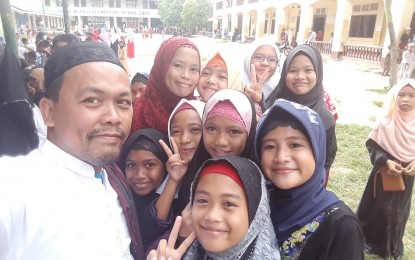
ZAMBOANGA CITY – If teachers are key to the destiny of their students and consequently their ever-unfolding society, then Abou-Benhar Sihabon is devoting his life to prove that dictum right.
His success in his professional and personal missions is validated by the Most Outstanding Teacher for Madrasah Education award that was conferred on him by the Department of Education during the World Teachers’ Day celebration last October 5 in Zamboanga City.
At present, Sihabon teaches madrasah education to 72 Grade 6 students divided into six sections at the Arena Blanco Elementary School – East.
His pupils include Muslim Badjaos, Tausugs, Sama Bangingis and a few Christians as well.
Sihabon, however, is more than just a plain and simple classroom teacher of that school for the past two years.
Under the Madrasah Education Program (MEP) which was initiated by DepEd back in 2004, kindergarten and Grades 1 to 6 Muslim pupils in public elementary schools are required to attend classes where they learn the “Arabic Language and Islamic Values” (ALIVE).
The instructions intend to build good character along Islamic traits and equip learners with a functional ability to speak, read and write Arabic so they could better participate in religious events or practices in their respective communities.
“It is a social education that aims to build character as well as solidarity among the students especially among those who belong to different tribal groups,” Sihabon said. “I have been seeing this happening in my students ever since I started teaching ALIVE in 2008.”



For instance, he said, bullying among peers has been reduced or eliminated in his campus.
The values being inculcated in the program include respect, honesty, solidarity, piety, humility, obedience to parents and laws, and the like. It is similar to the olden-day school training in good manners and right conduct.
Sihabon said aside from lectures, the lessons are also delivered through dialogues, singing of folk songs and nursery rhymes, role playing and the like, except dancing. They also take academic tests to check their learning progress.
The lessons, he explained, are totally free of any political or religious content. The same DepEd-made curriculum is used in all MEP schools, which in Zamboanga City, also involves four supervised private elementary schools.
All private weekend madaris (plural of madrasah) are also monitored by DepEd, he said, which helps to overcome apprehensions that these schools encourage violent religious beliefs and attitudes.
The use of uniform lessons in all madrasah schools, according to Sihabon, also aims to teach identical traits and attitudes among all students so that even if they belong to different tribes or come from different places, whenever they mingle, they are less likely to exhibit conflicting cultural biases or prejudices.
From kinder to Grade 3, the mother tongue is used as medium of instruction, then Pilipino and English in Grades 4 to 6.
What made Sihabon, who is a cheerful 45-year old half-Tausug and half-Sama from the municipality of Tongkil, Sulu, deserving of the Most Outstanding Teacher for Madrasah Education award?
He is currently the president of the Zamboanga City Association of ALIVE Teachers. He continually undergoes MEP trainings and exposures, and regularly echoes his learnings to the members of the association on his own initiative -- that is, even without support from DepEd -- to level up their teaching capacities.
If only for this commitment, he is outstanding indeed.
It is a personal vocation, too. In his youth, he said he studied in a private weekend madrasah. He completed a course on Islamic Studies in the Western Mindanao State University.
But even while in college, he would do rounds in public elementary schools in the city having Muslim enrollees to teach them the basics of Islam and Islamic values, in the same manner of Catholic catechists.
After finishing college, he became a DepEd contractual ALIVE teacher, and was later qualified for scholarship to study a two-year course in B.S. Elementary Education and eventually passed the teachers board exams.
Sihabon became a regular DepEd teacher in 2016.
Since then, he said he has been tapped to join a team that includes ulamas (Islamic teachers) who rewrite ALIVE textbooks.
Among the textbooks are those intended to also teach ALIVE to junior high schoolers possibly to start by next school year. Others, he said, are targeted to level up the quality of the contents.
Textbooks are also prepared for use in DepEd’s Alternative Learning System (ALS)..
“ALS is more challenging because the students are dropouts”, he said.
But wherever they may be, in campuses or in the nooks and crannies of barangays, these children and youths will not escape Sihabon’s noble mind-bending profession, vision and mission. (PNA)
